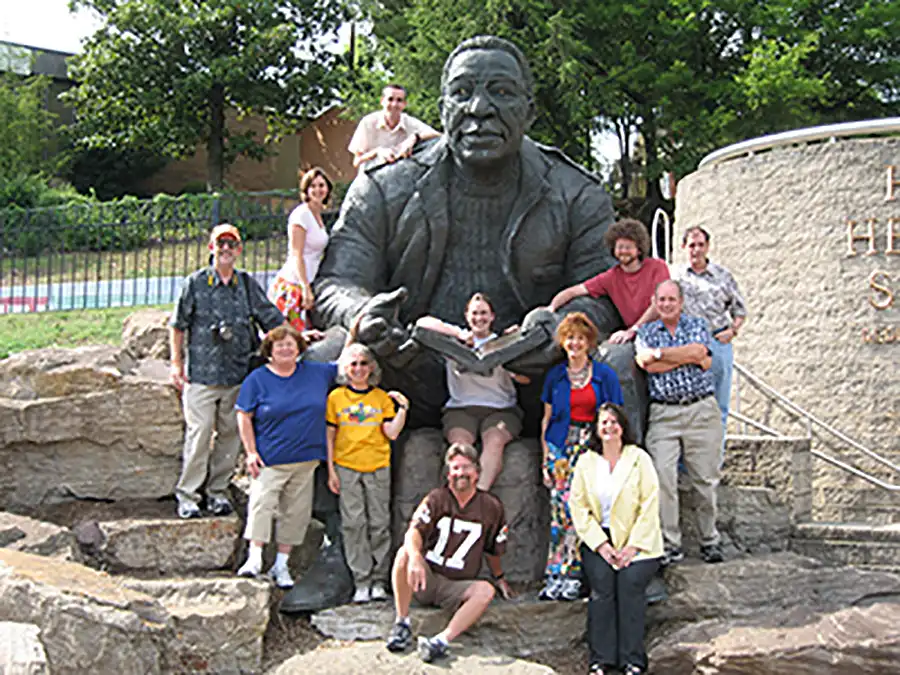Movement in Black Geographies
Movement in Black Geographies
In August, co-project investigators, Derek Alderman and Joshua Kenna were notified they had received a $191,236 grant from the National Endowment for the Humanities to host a three-week summer teacher institute in 2021 titled “Geographic Mobility in the African American Freedom Struggle.”

The proposed institute is a joint effort between Alderman, professor in the UT Department of Geography, and Kenna, associate professor in the UT Department of Theory and Practice in Teacher Education, with support from the Tennessee Geographic Alliance and Ethan Bottone (’20). The institute will provide 25 K-12 educators from across the US with an opportunity to participate in the NEH special initiative “A More Perfect Union” by exploring the history of the Civil Rights movement through geographic mobility—given that unfettered geographic mobility is a core democratic principle at the heart of the African American freedom struggle.
The goal of the planned institute is to contribute to the intellectual growth of participating educators and prepare them to create and disseminate important synergies between the teaching of history and the teaching of geography—two subjects increasingly joined together in the educational standards of many states. The institute offers a model of critical thought, instruction, and pedagogical application that supports ongoing calls for greater numbers of social studies educators, especially those in a still white-dominated field of geography, to address power and inequity.
The planned institute is also of specific importance to the wider community of geography, as the discipline centers the lives, contributions, and struggles of people of color within its teaching, research, and public outreach.
“Our project promises to bring together new critical scholarship in Black geographies to practicing teachers, which will in turn help their students learn how geographic mobility has long been central to the fight for African American civil rights and self-determination,” Alderman said. “While such a pedagogical approach is long overdue, it is urgently needed now as the nation reckons with the unjust way that the movements of Black communities continue to be policed and controlled.”
The institute’s foundational theme of geographic mobility, while informed by the traditional importance geographers place on spatial interaction, draws heavily from the more recent interdisciplinary “mobility turn.” This newer approach to mobility recognizes that the dynamics of where, when, and how we move is a product of social relations, the exercise of power, and cultural identity. Many types of movement will be addressed by the institute in the context of Black experiences in the US. These movements include private and public transportation across everyday spaces, migration and relocation into and out of regions, and touristic navigation and wayfinding through (un)welcoming communities and places.
The institute seeks to create a space for critical inquiry and collegial interaction that can help participants bring together and apply these two relatively recent intellectual approaches—the “mobility turn” and “Black geographies.” These analytical frameworks, while of growing currency within the humanities and social sciences, have thus far not had a significant place in pedagogical research or curriculum development. Using guest lectures, directed readings, hands-on learning, field trips, and teaching material development, institute organizers will demonstrate the way the right of mobility was shaped by, and in turn shaped, American systems of racism and anti-racist resistance.
This will be the first NEH-funded teacher institute hosted by the department since 2007. In 2002, 2004, and 2007, Charles Aikens, professor emeritus, and Tennessee Geographic Alliance Coordinator, Kurt Butefish, served as co-PIs on three successful four-week institutes focusing on the geography of the American South.
“This is a huge deal for me to have the opportunity to contribute to this project as I approach the end of my career,” Butefish said. “My work with previous institutes has provided some of the most memorable and rewarding highlights of my time at UT. Getting to work with the best of the best scholars in geography and related fields is so inspiring. And, I made lifelong friends with some of the many wonderful teachers from across the US who participated in those earlier institutes. I’m excited at the prospect of forging new friendships amongst this year’s cohort.”
